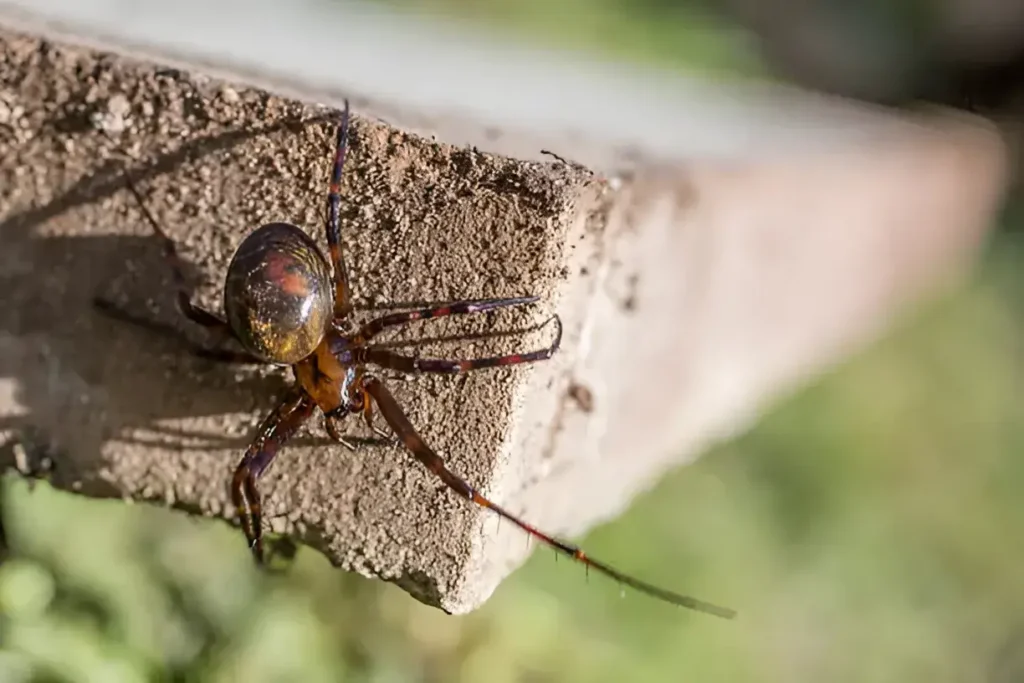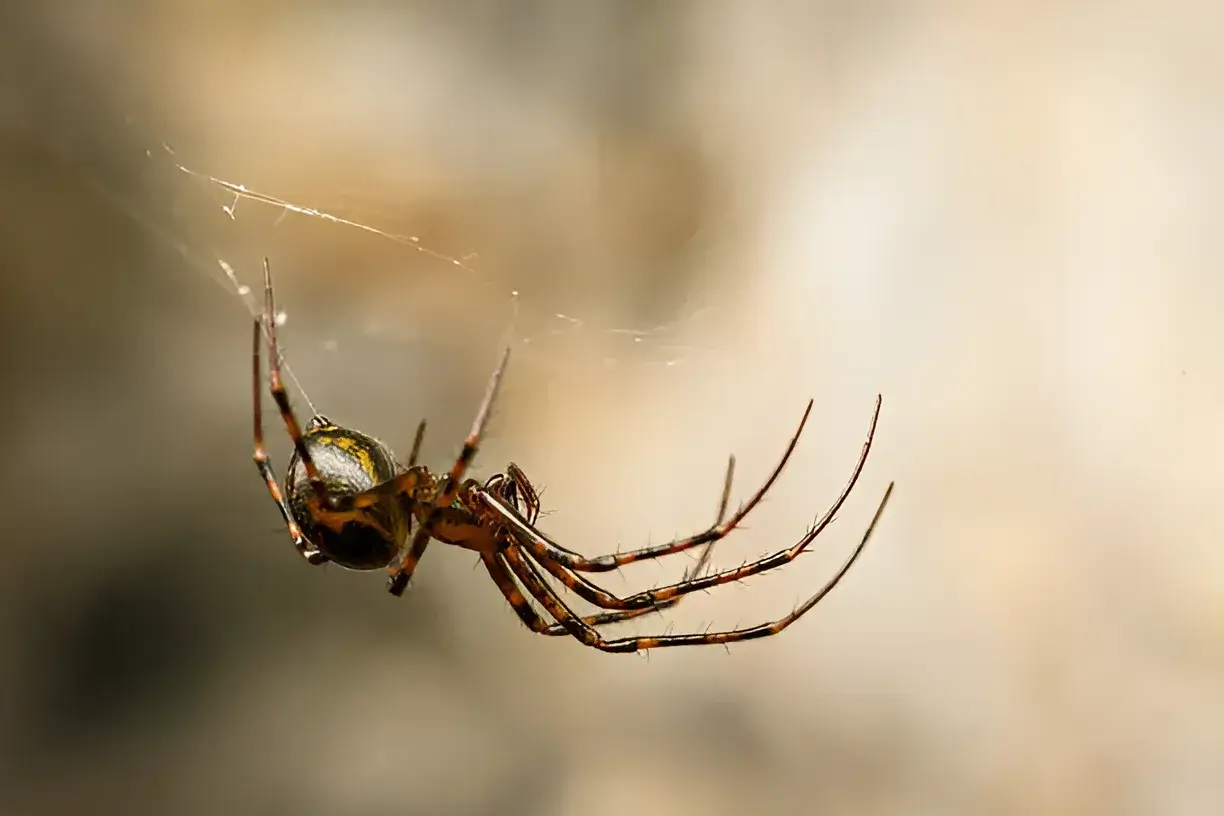The short answer is no. Most of the time, you don’t need to kill a false widow spider. These spiders are generally shy and beneficial to your environment. While their bites can be momentarily painful, they rarely pose significant danger to humans.
Understanding False Widow Spiders
While they may look similar to the infamous black widow, false widow spiders are significantly less dangerous. Here’s the lowdown:
- Appearance: The noble false widow, the most common type in the US, is usually dark brown or black. They often have cream-colored markings, which sometimes have a faint skull-like shape.
- Where they live: These spiders like undisturbed spaces, both inside and out. Check sheds, basements, garages, or beneath outdoor furniture.
- Behavior: False widows are shy and not naturally aggressive. They’re much more likely to retreat than to bite unless they feel cornered.
The Truth About False Widow Bites
What it feels like: Most people compare a false widow bite to a bee or wasp sting. You might expect some localized pain, redness, and maybe slight swelling. These symptoms tend to go away within a day or two.
When to be concerned: In very rare cases (especially if you have allergies or other health concerns), reactions can be more severe. If you develop spreading redness, fever, or trouble breathing, it’s best to seek medical advice.
Keep it clean: Like any small puncture wound, keep the bite area clean to reduce the risk of an infection developing.
Myth vs Fact
- Myth: False widow spiders are deadly.
- Fact: There have been no recorded fatalities caused by false widow spider bites.
- Myth: False widow spiders are aggressive and will chase you.
- Fact: These spiders are timid and prefer to avoid confrontation. They only bite in self-defense.
- Myth: You need to kill every false widow spider you see.
- Fact: In most cases, peaceful coexistence is possible. Relocation is often a better solution.
What to Do If You’ve Been Bitten by a False Widow

1. Stay Calm: Remember that severe reactions are extremely rare.
2. Cleanse the Area: Gently wash the bite with soap and water to minimize the risk of infection.
3. Cool Compress: Apply a cool, damp washcloth to the area to soothe discomfort and reduce swelling.
4. Observe the Bite: Most bites will cause localized pain, redness, and maybe some swelling. These symptoms should subside within a few days.
5. When to Seek Medical Help: Reach out to your doctor if you experience any of the following:
- The redness or swelling spreads significantly or worsens over time.
- You develop a fever, chills, or feel generally unwell.
- You have difficulty breathing or experience tightness in your chest.
- You have existing health conditions or allergies that cause concern.
When Peaceful Coexistence is Best
False widow spiders are our eight-legged neighbors, and they play a role in the ecosystem by controlling insect populations. If the spider isn’t in a high-traffic area, consider simply leaving it alone.
When Relocation Might Be Necessary
- Sensitive Locations: If you discover a false widow near a child’s bed or a common play area, relocation might be a good option for peace of mind.
- Individual Concerns: Those with severe phobias or health sensitivities may prefer to remove the spider.
How to Safely & Humanely Relocate a False Widow Spider

- The classic method: Trap the spider under a clear cup and slide a sturdy piece of paper underneath for easy transport.
- Set them free: Release the spider in a quiet outdoor place like a shed or garden, away from areas where you frequently spend time.
Natural Deterrents
To discourage false widows from setting up shop inside your home:
- Keep Things Tidy: Reduce clutter and potential hiding spots.
- Seal Entry Points: Check for gaps around windows and doors.
- Try Essential Oils: Peppermint and eucalyptus oils are sometimes used as natural spider deterrents.
When to Consider Professional Help
- Dealing with many spiders: If you suspect a large infestation, a pest control expert can assess the situation and offer solutions.
- Managing phobias: If you have a severe spider phobia, a professional can provide the most stress-free removal.
Conclusion
False widow spiders have earned an undeservedly fearsome reputation. Understanding their behavior and the true risks associated with their bites helps us make balanced decisions. Most of the time, peaceful coexistence is possible and even beneficial!
The photo featured below the post headline is Credit: Morten Falch Sortland/istockphoto
I hope you find this post helpful and informative. If Yes’ feel free to share it with your friends!
Frequently Asked Question
Are false widow spiders deadly?
No. There have been no recorded fatalities from false widow spider bites.
How can I tell the difference between a false widow and a black widow?
Black widows usually have a distinct red hourglass marking on their underside.
Will false widows invade my home?
They prefer quiet spaces out of the way. Large-scale infestations are uncommon.
How do I keep false widows out of my house?
Sealing cracks, reducing clutter, and using potential deterrents like essential oils can help make your home less appealing.
Do false widows bite?
Yes, they can bite, but they generally do so only if feeling trapped or threatened.
How aggressive are false widows?
These spiders are not aggressive and prefer to avoid confrontation with humans.
Should I kill a false widow spider?
In most cases, no. These spiders are beneficial and relocation is often a better option.
What is the lifespan of a false widow spider?
False widows can live for several years, with females generally living longer than males.
Where do false widow spiders live?
They can be found indoors and outdoors, preferring dark, sheltered places like sheds, garages, and undisturbed corners of a house.
What should I do if I find a false widow spider in my bed?
Carefully relocate it using the cup and paper method. Consider checking for further signs of spiders to prevent future surprises.
Are false widow bites dangerous to pets?
While a bite may be uncomfortable for a pet, it’s unlikely to cause severe reactions. Monitor your pet for any concerning symptoms.

